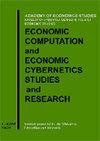Linking e-Government to Socio-Demographics. A Multi-Model Approach Using Panel Data, Regression, and Neural Networks
IF 1
4区 经济学
Q3 ECONOMICS
Economic Computation and Economic Cybernetics Studies and Research
Pub Date : 2023-06-21
DOI:10.24818/18423264/57.2.23.04
引用次数: 0
Abstract
. The emergence of the Internet as a central phenomenon of the post-industrial era has generated structural changes in all socio-economic processes, including public administration. On this note, e-government has become the new practice, aimed to reshape the relationship between state and citizen, but showing considerable differences in the way it is adopted worldwide. Therefore, this paper proposes a methodology for assessing whether socio-demographic characteristics such as the urban population, the average years spent in school, or the overall median age of the population can successfully explain the level of e-government adaptation (measured through the EGDI). To observe it, we will use data from six years, from 2010 to 2020, and 130 countries of the UN. As tools, we have employed a multi-model approach that consists of regression and neural network models, with two main directions of analysis: individual yearly methods and longitudinal panel data.将电子政府与社会人口学联系起来。一种使用面板数据、回归和神经网络的多模型方法
.互联网作为后工业时代的一个中心现象的出现,使包括公共行政在内的所有社会经济进程发生了结构性变化。在这一点上,电子政务已成为一种新的做法,旨在重塑国家和公民之间的关系,但在世界范围内采用电子政务的方式存在相当大的差异。因此,本文提出了一种评估社会人口特征(如城市人口、平均在校年限或人口的总体中位年龄)是否能够成功解释电子政务适应水平(通过EGDI测量)的方法。为了观察它,我们将使用2010年至2020年六年的数据,以及联合国130个国家的数据。作为工具,我们采用了一种由回归和神经网络模型组成的多模型方法,有两个主要的分析方向:个人年度方法和纵向面板数据。
本文章由计算机程序翻译,如有差异,请以英文原文为准。
求助全文
约1分钟内获得全文
求助全文
来源期刊

Economic Computation and Economic Cybernetics Studies and Research
MATHEMATICS, INTERDISCIPLINARY APPLICATIONS-
CiteScore
1.80
自引率
22.20%
发文量
60
审稿时长
>12 weeks
期刊介绍:
ECECSR is a refereed journal dedicated to publication of original articles in the fields of economic mathematical modeling, operations research, microeconomics, macroeconomics, mathematical programming, statistical analysis, game theory, artificial intelligence, and other topics from theoretical development to research on applied economic problems.
Published by the Academy of Economic Studies in Bucharest, it is the leading journal in the field of economic modeling from Romania.
 求助内容:
求助内容: 应助结果提醒方式:
应助结果提醒方式:


